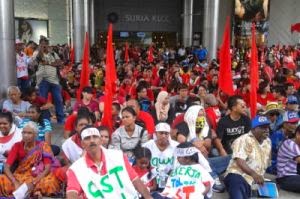Pakatan dwells on wide reaching issues pertaining to the GST; as they strongly believe that M’sia may well be heading towards more corruption and fraudulent practices.
COMMENT

By Raja Ahmad Shahrir
The avoidance of taxes is the only intellectual pursuit that carries any reward – John Maynard Keynes
Today, Pakatan is presenting the shadow budget in anticipation of the Federal 2014 Budget. One important area that warrants serious attention is the implementation of the goods and services tax (GST).
In the past 20 years or so, GST (or in some countries VAT (value added tax)) has been implemented in developed and developing countries to broaden the tax base and increase government revenue. The official website of the Royal Malaysian Customs Department states that as of 2010, a total of 146 countries have implemented GST/VAT.
Malaysia is expected to generate revenue of RM20.5billion with the implementation of 4% GST (except on basic necessities such as rice, flour, cooking oil, education, public healthcare etc). This is a 36% increase in revenue compared to the existing sales and service tax (SST), which the GST is meant to replace.
Thus, the GST is expected to account for approximately 13-14% of total tax revenue if implemented, as compared to 9.9% in 2012 with SST.
However, the key question is, what are the risks involved when GST is implemented by a government that is not managed effectively and efficiently?
Historically, two key risks emerge when a country tries to implement GST without first having effective processes and policies in place for better governance.
Firstly, the potential for fraudulent practices may arise among businesses and government officials, and secondly, the potential for failure due to lack of proper planning.
Potential for fraudulent practices
In essence, the GST’s mechanism is such that products and services are taxed at each stage of the supply chain, resulting in an input and output tax. The input tax incurs on business purchases and expenses (relevant to manufacturers or retailers), while the output tax is the tax charged to the buyer. For businesses (consumers generally have no input tax), the difference between the output from the input tax is the amount paid to the government.
However, if the input tax exceeds the output tax, then the business can claim a refund. This creates an opportunity for corruption as the power of tax officials to make refunds may open doors to bribery by business owners. Furthermore, a government that faces budget pressures may also delay refunds to businesses. These fraudulent practices are not only evident with the implementation, but also during revisions to the GST.
In India, the GST was revised lower and consumers should have benefited from the reduced tax sales. Unfortunately, due to lack of monitoring, businesses were keeping the extra gain by charging consumers at the same price levels.
In Pakistan, government officials are wary of the potential for corruption and under-invoicing as the country is considering increasing the GST from 16% to 17%.
Without proper management, it is not surprising for some countries to discover that the implementation of GST indeed lowers government revenue, instead of increasing it.
Potential failure due to lack of proper planning
In 1995, Ghana implemented the VAT system that lasted only three and a half months.
The main reason for Ghana’s failure was due to improper management of public perception, insufficient time to identify the right people to implement procedures and starting taxpayers’ registration, and an unprepared tax administration. All these factors boiled down to the government’s inefficient and ineffective planning prior to implementation.
A similar case occurred in Ukraine from 1998 to 2004; real GDP rose by 49%, but the VAT to GDP ratio decreased by 33%. Generally as GDP grows, VAT yield should also rise with at least the same rate as GDP.
A study found that the decline in VAT to GDP ratio was caused by the country’s ineffective tax administration.
Successful GST implementation is contingent to income equality
The chart above (GST vs CPI) shows the transparency level of a country and its GST/VAT rate.
70% of the top four countries have GST/VAT rate of more than 15% (highest is 25% for Norway, Canada and Denmark, the most transparent at number 1).
Coincidently, Denmark leads the way with regard to distribution of income. Not surprising then, that Denmark has the lowest rate of poverty in Europe.
Having a broad based tax system can be socially successful if the income distribution is flatter within the country.
Gini Coefficient and GST
The issue of regressive tax will not be as evident if the gap between the rich and poor is not too large. Therefore, a quick look at the top ten most transparent countries shows that 8 have a GST/VAT that is more than 10%. However the Gini coefficient of these 7 countries is within the 25 – 35 range.
In comparison with countries such as Paraguay, Zimbabwe, Russia, Vietnam, Indonesia, Papua New Guinea and Venezuela (GST/VAT rate of 10%, 15%, 12%, 10%, 10%, 10% and 16.5% respectively), the Gini coefficient ranges between 36 – 52, with Paraguay, Zimbabwe, Russia, Papua New Guinea and Venezuela all above the 40s mark.
In Malaysia, the Gini coefficient is higher even compared to Indonesia, Thailand and Philippines. Lower income groups will have to fork out more of their income to GST.
There are also other factors that should be taken into consideration prior to GST’s implementation. Among them are the infrastructure, the people, the processes and policies.
With the on-goings in Malaysia such as the NFC, guns missing in the sea (and possibly toilet), large spending on computers and study trips, the question looms if GST should be implemented.
The government should instead focus on the root cause that is causing serious leakages in public funds. From a government’s management perspective, we have a cost issue, and not revenue.
Raja Ahmad Shahrir is Research Associate at Institut Rakyat, a think tank affiliated with PKR. He tweets at @RajaShahrir and facebook Raja Ahmad Shahrir











